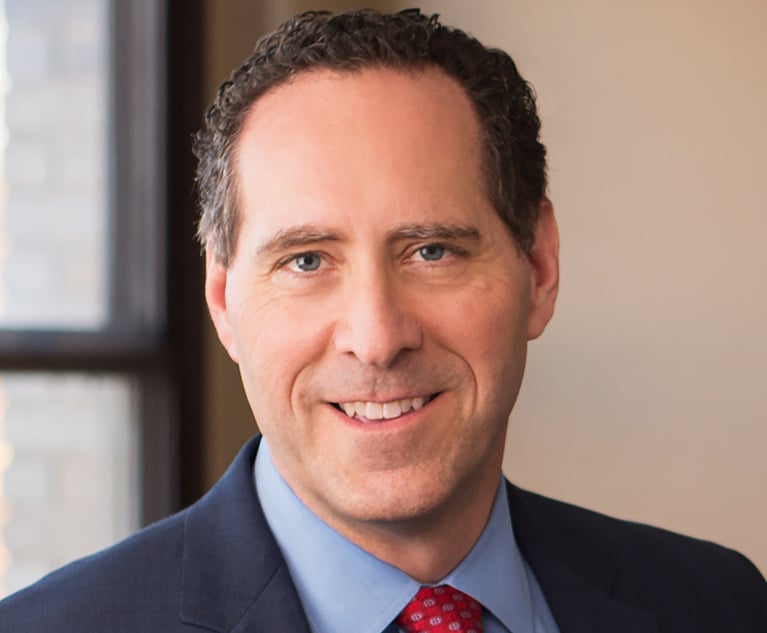Myth or Reality: Conquering the Enemies of Return-to-Office
Reality: The 80-hour in-office work week has gone the way of the rotary phone. Lawyers and professional staff alike are refusing to be bound by hard-and-fast rules chaining them to their desks. This shift was inevitable—and the pandemic accelerated it to a whiplash pace.
November 21, 2022 at 10:47 AM
9 minute read
 Marcie Borgal Shunk, President and Founder of the The Tilt Institute Inc. Courtesy photo
Marcie Borgal Shunk, President and Founder of the The Tilt Institute Inc. Courtesy photo
Smart Strategy
Reality: The 80-hour in-office work week has gone the way of the rotary phone. Lawyers and professional staff alike are refusing to be bound by hard-and-fast rules chaining them to their desks. This shift was inevitable—and the pandemic accelerated it to a whiplash pace. In response, the majority of today's leaders are defaulting to what they know best—providing decisive advice and practical solutions to sticky problems. After all, these are the skills that make them successful in their role as counselors. Return-to-office, however, is a complex situation. There is no single solution.
In the return-to-office conversation, several perceived "truths" about the value of being in the office have become core to the discussion and a source of debate. These include:
- Unless we go back to the office we can't …
- Cultivate our culture
- Provide the right development and mentorship
- Develop and enhance personal connections
- Attract and retain talent
While there is some truth behind these reasons, collectively, there is little evidence to support these myths outright. They are emblematic, instead, of a perpetual tendency as an industry (and, perhaps, as people) to hold on to the past as the best indicator of future success. Each idea has merit, yes, yet each also holds an alternate reality—one where law firm leaders can find and profit from embracing remote work by learning new ways to lead and engage.
We can't … cultivate our culture.
This content has been archived. It is available through our partners, LexisNexis® and Bloomberg Law.
To view this content, please continue to their sites.
Not a Lexis Subscriber?
Subscribe Now
Not a Bloomberg Law Subscriber?
Subscribe Now
NOT FOR REPRINT
© 2025 ALM Global, LLC, All Rights Reserved. Request academic re-use from www.copyright.com. All other uses, submit a request to [email protected]. For more information visit Asset & Logo Licensing.
You Might Like
View All
AI and Social Media Fakes: Are You Protecting Your Brand?

Trump RTO Mandates Won’t Disrupt Big Law Policies—But Client Expectations Might
6 minute read
Montgomery McCracken Touts 'Record' Financial Performance Despite Shrinking Head Count
6 minute read
Cohen Seglias Leader Discusses Growing From Construction Practice into Full-Service Law Firm
Trending Stories
- 1Second DCA Greenlights USF Class Certification on COVID-19 College Tuition Refunds
- 235 Years After CT's Affordable Housing Act, Progress Remains a Struggle
- 3Bankruptcy Judge Clears Path for Recovery in High-Profile Crypto Failure
- 4Reality TV Couple and Pacific Palisades Neighbors Sue City of Los Angeles Over Loss of Homes to Fire
- 5Colgate Faces Class Actions Over ‘Deceptive Marketing’ of Children’s Toothpaste
Who Got The Work
J. Brugh Lower of Gibbons has entered an appearance for industrial equipment supplier Devco Corporation in a pending trademark infringement lawsuit. The suit, accusing the defendant of selling knock-off Graco products, was filed Dec. 18 in New Jersey District Court by Rivkin Radler on behalf of Graco Inc. and Graco Minnesota. The case, assigned to U.S. District Judge Zahid N. Quraishi, is 3:24-cv-11294, Graco Inc. et al v. Devco Corporation.
Who Got The Work
Rebecca Maller-Stein and Kent A. Yalowitz of Arnold & Porter Kaye Scholer have entered their appearances for Hanaco Venture Capital and its executives, Lior Prosor and David Frankel, in a pending securities lawsuit. The action, filed on Dec. 24 in New York Southern District Court by Zell, Aron & Co. on behalf of Goldeneye Advisors, accuses the defendants of negligently and fraudulently managing the plaintiff's $1 million investment. The case, assigned to U.S. District Judge Vernon S. Broderick, is 1:24-cv-09918, Goldeneye Advisors, LLC v. Hanaco Venture Capital, Ltd. et al.
Who Got The Work
Attorneys from A&O Shearman has stepped in as defense counsel for Toronto-Dominion Bank and other defendants in a pending securities class action. The suit, filed Dec. 11 in New York Southern District Court by Bleichmar Fonti & Auld, accuses the defendants of concealing the bank's 'pervasive' deficiencies in regards to its compliance with the Bank Secrecy Act and the quality of its anti-money laundering controls. The case, assigned to U.S. District Judge Arun Subramanian, is 1:24-cv-09445, Gonzalez v. The Toronto-Dominion Bank et al.
Who Got The Work
Crown Castle International, a Pennsylvania company providing shared communications infrastructure, has turned to Luke D. Wolf of Gordon Rees Scully Mansukhani to fend off a pending breach-of-contract lawsuit. The court action, filed Nov. 25 in Michigan Eastern District Court by Hooper Hathaway PC on behalf of The Town Residences LLC, accuses Crown Castle of failing to transfer approximately $30,000 in utility payments from T-Mobile in breach of a roof-top lease and assignment agreement. The case, assigned to U.S. District Judge Susan K. Declercq, is 2:24-cv-13131, The Town Residences LLC v. T-Mobile US, Inc. et al.
Who Got The Work
Wilfred P. Coronato and Daniel M. Schwartz of McCarter & English have stepped in as defense counsel to Electrolux Home Products Inc. in a pending product liability lawsuit. The court action, filed Nov. 26 in New York Eastern District Court by Poulos Lopiccolo PC and Nagel Rice LLP on behalf of David Stern, alleges that the defendant's refrigerators’ drawers and shelving repeatedly break and fall apart within months after purchase. The case, assigned to U.S. District Judge Joan M. Azrack, is 2:24-cv-08204, Stern v. Electrolux Home Products, Inc.
Featured Firms
Law Offices of Gary Martin Hays & Associates, P.C.
(470) 294-1674
Law Offices of Mark E. Salomone
(857) 444-6468
Smith & Hassler
(713) 739-1250





